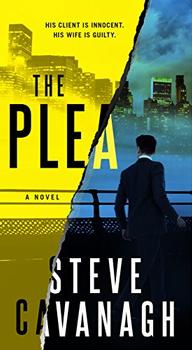Summary | Excerpt | Reviews | Beyond the Book | Readalikes | Genres & Themes | Author Bio

CHAPTER ONE
SUNDAY, MARCH 15TH
48 hours until the shot
My key slid into the lock.
I froze.
Something wasn't right.
The mahogany front door to the four-story sandstone building that housed five offices, including my one-man law practice, looked like any other at this end of West Forty-sixth Street. The area was a mix of bars, noodle houses, high-class restaurants, accountants' practices, and private medical consulting rooms, with each set of offices becoming classier the closer you got to Broadway. The paneled front door to my building had been painted blue about a month ago. The reverse side of the door boasted a hand-cut, steel-back plate—a little surprise for anyone who thought they could kick through one of the panels and open the door from the inside.
It was that kind of neighborhood.
When it comes to locks, I don't have much experience. I don't carry picks; never had a use for them, even in my former life as a con man. Unlike a lot of grifters, I didn't target the ordinary inhabitants of New York. I had my sights set on the kind of individual that deserves to get his pocket picked. My favorite marks were insurance companies. The bigger the better. The way I saw it, they were the biggest con operation in the world. Only fair that they get their pocket felt once in a while. And to con an insurance company I didn't need to break in; I just had to make sure I got invited. My game wasn't all about the talk. I had the physical moves to back it up. I'd spent years studying sleight of hand. My dad had been quite the artist, a pro who worked the bars and subways. I learned from him, and over time I'd developed a deft touch: a profound sense of weight, feel, and movement. My father called it "smart hands." It was this finely honed sense that told me something was wrong.
I removed the key from the lock. Slid it back in. Then out. Repeat.
The action was quieter and smoother than I'd remembered. Less clunky, less resistance, less pressure required. My key almost slid in by itself, as if it were moving through cream. I checked the teeth; they were as hard and sharp as freshly cut keys could get. The face of the lock, a standard double-cylinder dead bolt, bore scrapes around the keyhole, but then I remembered that the guy who ran the travel agency in the downstairs office liked bourbon in his morning coffee. I'd heard him fumbling with his keys a few times, and on the one morning that I'd passed him in the lobby, his breath had almost knocked me over. A year ago I wouldn't have noticed. I would've been just as drunk as the travel agent.
Scrapes on the lock face aside, there was no denying the drastic change in the key action. If the landlord had changed the lock mechanism, my key wouldn't have worked. No discernible odor from the lock or the key, which was dry to the touch. If a can of WD-40 had been sprayed in, I would've noticed the smell. There was really only one explanation: Somebody had forced the lock since I'd left the office earlier that morning. Sundays in the office were a necessary evil since I'd taken to sleeping in the place. I could no longer afford to keep up the rent on my apartment and an office. A foldout bed in the back room was all I needed.
The landlord couldn't afford an alarm system. Neither could I, but I still wanted some measure of security. The door opened inward. I cracked it half an inch and saw the dime resting in the hollowed-out section on the right-hand side of the doorframe, the lock side, the door itself covering half the coin, stopping it from falling onto the step. In the evening, when I went out to get food, I slipped a dime into the gap between the frame and the door, slotting it into the dime-shaped hole I'd cut into the frame with a penknife. If somebody broke in and didn't want me to know, he would hear the dime fall, recognize it as craft, and be careful to replace it. The hope lay in the intruder focusing on the noise and sparkle of the falling dime and failing to notice the toothpick jammed precisely ten inches above the first hinge on the opposite side of the door.
Excerpted from The Plea by Steve Cavanagh. Copyright © 2018 by Steve Cavanagh. Excerpted by permission of Flatiron Books. All rights reserved. No part of this excerpt may be reproduced or reprinted without permission in writing from the publisher.
Your guide toexceptional books
BookBrowse seeks out and recommends the best in contemporary fiction and nonfiction—books that not only engage and entertain but also deepen our understanding of ourselves and the world around us.